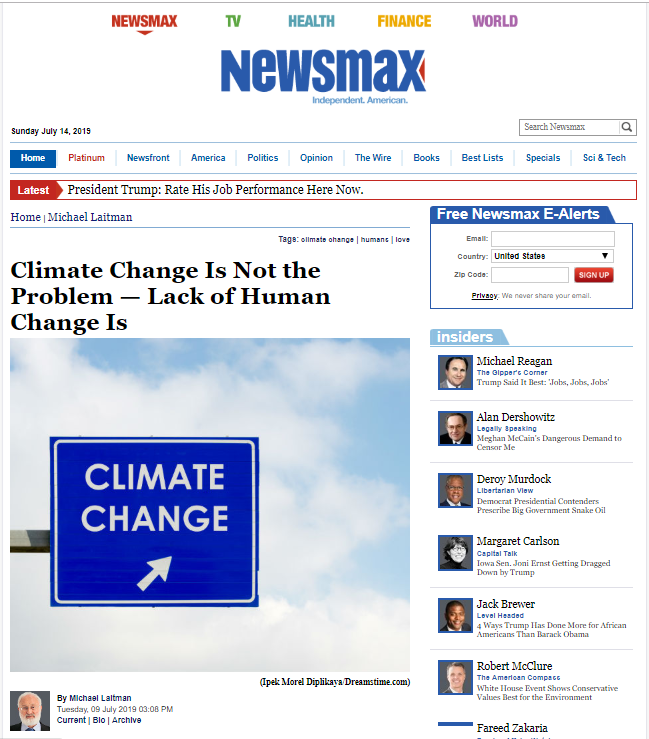
Nature has recently sent us strong reminders of its immense power.
Two major earthquakes — the strongest in decades — rattled Southern California in the last few days. An extreme hailstorm hit Mexico. Meanwhile, Alaska experienced record high summer temperatures and across the Atlantic, an unprecedented heatwave gripped Europe, triggering wildfires and causing emergency health alerts.
While we humans feel helpless under these hardships, it is precisely at the human level, the greatest and most influential in the entire system of nature, where it is possible to bring about balance on the planet. How? By upgrading the quality of human relations. Doing so would have far more positive impact on our planet than climate treaties and ecological campaigns could ever have.
The U.S. withdrawal from the Paris Climate Accord has been criticized by the international community with claims that the action ignores the extreme urgency of tackling the problem of climate change.
But I concur with President Trump that cleaning the ecosystem does not touch the crux of the matter, even though many people believe it to be the panacea. Billions of dollars are slated to be invested in measures that are destined to fail to have any positive ecological effect. Instead, funds should be assigned to education to build more harmonious relations between people, the realization of which will manifest in the creation of a better world in every respect.
How can improving human relations have a positive effect on the ecology? We can understand how by looking briefly at the four levels of nature: inanimate, vegetative, animate, and human. Every subsequently higher level is more powerful than and controls the level beneath it. Therefore, to change the trajectory of nature as a whole to a positive course can only be accomplished from the human level, the most developed and pivotal of all. For the time being, human impacts on the system are negative, but they can be transformed into positive ones. We must understand that modification of the natural system doesn’t work as is commonly thought, by acting to save the ecological balance, whether it be by saving trees or certain animal species, stopping the pollution of oceans or the air, or myriad other actions we might devise in order to try to be more ecologically friendly. No such actions will help the environment because they do not touch the fundamental cause of its disturbance.
Where then is the root problem with the ecology? The problem is with human beings, or more precisely, with how we relate to one another. Because of our innate human ego, our desire to enjoy at the expense of others, we step on everyone and everything — including nature — in order to do so. Therefore, in order to bring about a new level of ecological balance all we need to work on is repairing connections at the human level itself.
Even if tomorrow the whole of humanity stopped polluting the environment, halted burning fossil fuels, or avoided using pesticides, we would nevertheless continue to see ecological disasters coming at us from every direction because above all the other ecological levels of nature, human relations — the most influential aspect of nature — would remain broken. Our exploitative, manipulative, and abusive relations toward each other would continue to cause negative ripples throughout all levels of nature, creating a negative feedback loop upon us as nature’s negative reaction to human input.
If instead, we create positive emotional connections to bring balance between us and nature, wouldn’t we nevertheless still have to do the many recommended ecological actions in parallel?
It may come as a surprise, but no. Why? It’s because nature, from a higher level, would take care of balancing all these phenomena itself. The principle here is that nature’s governing higher level is able to correct all corruptions of its lower levels. In the wisdom of Kabbalah, this principle is called “love covers all transgressions.”
Since we currently have corrupt attitudes toward one another in which we relate to each other through a consistently egoistic lens — self-benefit at the expense of others — we cannot fix anything at the lower inanimate, vegetative, or animate levels because we simply input our egoistic attitude into the system and it feeds back negatively upon us. By investing into the human level alone, i.e. in positive human connections, we also activate the quickest and most dynamic change possible: the moment we cause a positive change in human relations, the lower levels of nature will experience immediate positive effects.
How fast and far must we move to save the planet and ourselves? Do we all need to reach harmonious relations right away, or is it enough for us to have a tendency toward positive connections? If I only start moving toward the goal of “loving your friend as yourself,” as remote as it may look, then even by making the first tiniest step toward it, I already impact a change in the entire natural system. Why? It is because my attitude changed.
By changing my attitude toward nature, i.e. by wanting to relate to it globally and integrally, as a single unified system, and with a loving and caring attitude, then even though I only slightly set off a trigger in that new direction, I nevertheless activated the entire system toward the direction of positive unification. No more than that is demanded of us.
We need only deal with human relations. The lower levels of nature will then all adjust and balance with us when we harmonize our connections to each other. Therefore, all we need is the kind of education and influences that will set us on course to achieve positive human connection in order to be able to enjoy a harmonious life balanced with the whole system of nature.
Featured in Newsmax